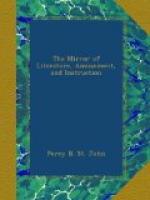To pay a very great deference in opening upon a place of scripture, as to its affording an assurance of salvation, used to be a very common practice amongst the people called Methodists, but chiefly those of the Calvinistic persuasion; this, it is probable, has declined in proportion with the earnestness of these people in other respects. They had also another opinion, viz. that if the recollection of any particular text of scripture happened to arise in their minds, this was likewise looked upon as a kind of immediate revelation from heaven. This they call being presented or brought home to them!
* * * * *
THE GATHERER
“I am but a Gatherer
and disposer of other
men’s stuff.”—Wotton.
* * * * *
Whoever the following story may be fathered on, Sir John Hamilton was certainly its parent. The duke of Rutland, at one of his levees, being at a loss (as probably most kings, princes, and viceroys occasionally are) for something to say to every person he was bound in etiquette to notice, remarked to Sir John Hamilton that there was “a prospect of an excellent crop:—the timely rain,” observed the duke, “will bring every thing above ground.” “God forbid, your excellency!” exclaimed the courtier. His excellency stared, whilst Sir John continued, sighing heavily as he spoke:—“yes, God forbid! for I have got three wives under it.”—Barrington’s Sketches.
* * * * *
It is a singular circumstance that Italia, or, as it is called in English, Italy, has, under all the changes and revolutions to which it has been subjected, always preserved its name. Every other country in Europe is now known to its inhabitants by other names than were given to it by their ancestors in the time of the Romans; but Italia continues to be the name of the country at the present day, and we have no authentic records by which we can ascertain that it ever bore any other.
* * * * *
SINGULAR INSCRIPTION.
Written over the Ten Commandments in a church in Wales.
PRSVRYPRFCTMN
VRKPTHSPRCPTSTN
The meaning can only be developed by adding the vowel E, which makes the sense thus—
Persevere ye perfect men
Ever keep these precepts ten.




